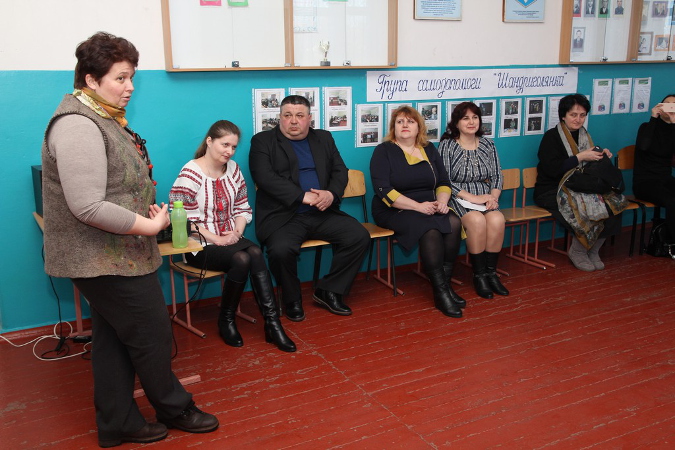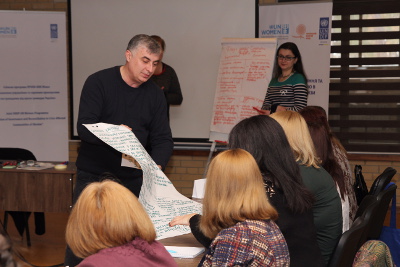Women gain voice and leadership in conflict-affected eastern Ukraine
Crisis recovery and decentralization create complex challenges for conflict-affected areas. A UN Women initiative brought Ukrainian and Georgian women’s groups together to share experiences in getting most vulnerable populations to participate in local decision-making.Date:

While decentralization reform in conflict-affected areas can empower citizens by getting them to participate in public life and local governance, it does not automatically benefit women and men equally. Recovering from crisis requires recognising and responding to women and men’s unique, often different needs – particularly if they are among the most vulnerable.
The majority of the internally displaced by ongoing conflict in Eastern Ukraine are women. Many of them are single heads of households and face discrimination like lack of access to housing, livelihoods and essential social services.
A joint programme by UN Women and UNDP, funded by the European Union, is helping to integrate gender-sensitive approaches to the decentralization process in the conflict-affected regions of Donestsk and Luhansk. The initiative draws on experiences in Georgia to enhance the participation in local development of internally displaced and conflict-affected women. Dialogues within communities helped ensure more inclusive decision-making, and local policy-making that respects human rights, gender equality and addresses the needs of the most vulnerable.
With support from a consortium of Georgian women’s organizations, the Women’s Information Center, and the Taso Foundation, the Ukrainian Women’s Fund helped train women on ways to empower local women’s groups in conflict-affected eastern Ukraine.

Groups in Donetsk and Luhansk oblasts now assist the most vulnerable by bringing unity to their voices and concerns in public dialogues. Community involvement includes participation from women IDPs, single heads of households, women living with HIV/AIDS, older people, and persons with disabilities.
“Our people tend to be inactive. Usually they wait for someone to come and start improving living conditions and community infrastructure. After training, we now understand that only we can make our community a better place,” says Natalya Gordiyenko, leader of a self-help group in the village of Bylbasivka in Donetsk Oblast.
After training sessions, participating communities conduct gender and conflict-sensitive assessments to identify the most vulnerable groups and understand their needs. Series of training of local women’s groups and capacity development through field visits and coaching by representatives of the Georgian NGO led to the creation of 61 community and self-help groups with more than 400 members, largely women, in 20 hromadas (amalgamated communities).
Two of these communities have already formed local gender coordination councils. These, in turn, will conduct budget analyses and allocate funds based on public consultations, including with local women’s groups.
As the decentralization reform includes transferring more authority to communities, women have been gradually acquiring the skills necessary to take on leadership roles and help their communities recover.
“I learned that it is not difficult to implement small initiatives in our communities. The training has encouraged me and now I can see what we can accomplish ourselves,” says Iryna, who was displaced together with her family in 2014 and had to start a new life.